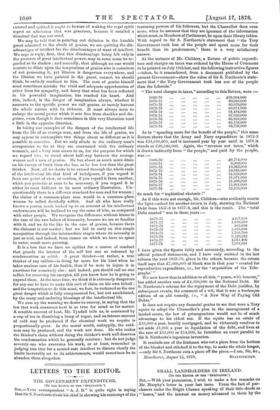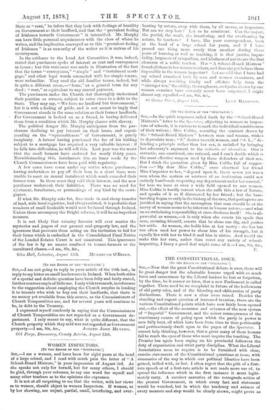SMALL LANDHOLDERS IN IRELAND.
(TO THE EDITOR OP THE 'SPECTATOR.') SIR,—With your permission, I wish to make a few remarks on Mr. Murphy's letter in your last issue. From the fact of pur- chasers under the Bright Clauses speaking of their title-deeds as "leases," and the interest on money advanced to them by the
State as "rent," he infers that they look with feelings of hostility on Government as their landlord, and that the "prevalent feeling of Irishmen towards Government" is intensified. Mr. Murphy can have little personal acquaintance with the class of whom he writes, and the implication conveyed as to this "prevalent feeling of Irishmen" is as unworthy of the writer as it is untrue of his countrymen. In the evidence to the Land Act Committee, it was, indeed, stated that purchasers spoke of interest as rent and conveyances as leases ; but this statement was made in illustration of the fact that the terms "conveyance," " simple " and "instalment mort- gage," and other legal words connected with fee-simple tenure, were unfamiliar. They used the old familiar terms, indeed, but in quite a different sense,—" lease," as a general term for any deed ; "rent," as equivalent to any annual payment.
The purchasers under the Church Act thoroughly understand their position as owners, subject in some cases to a debt to the State. They may say, " We have no landlord but Government," but it is with a feeling of pride, and is not meant to imply that Government stands in the same relation as their former landlords. For Government is looked on as a friend, in having delivered them from a condition which Mr. Murphy classes with slavery.
The political danger Mr. Murphy anticipates from the pur- chasers declining to pay interest on their loans, and experi- menting on the " squcezableness" of Government, is purely imaginary. A farmer having purchased the fee of his holding subject to a mortgage has acquired a very valuable interest : if he falls into difficulties, he will sell this. Last year was the worst that the small farmers have endured for nearly thirty years. Notwithstanding this, instalments due on loans made by the Church Commissioners have been paid with regularity.
A few cases have come under my notice where purchasers, having undertaken to pay off their loan in a short time, were unable to meet an annual instalment which much exceeded their former rent. In these cases they sold their interest, and the new purchaser undertook their liabilities. There was no need for ejectment, foreclosure, or proceedings of any kind by the mort- gagees.
If what Mr. Murphy asks for, free-trade in and cheap transfer of land, with local registries, had always existed, it is probable that numbers of small freeholds would now be found through Ireland. Unless these accompany the Bright scheme, it will be an imperfect measure.
It is not likely that country farmers will ever master the mysteries and jargon of our present real-property law, and the ignorance that prevents them acting on the invitation to bid for their farms which is embodied in the Consolidated Final Notice of the Landed Estates Court is not unnatural. This ignorance of the law is by no means confined to tenant-farmers or the uncultured classes.—I am, Sir, &c., Glen Hall, Leicester, August 12111. MunRouGli O'BRIEN.































 Previous page
Previous page